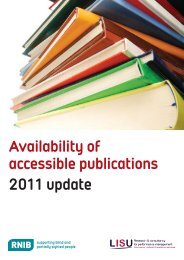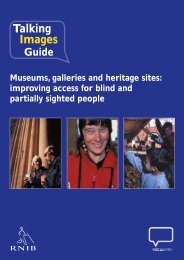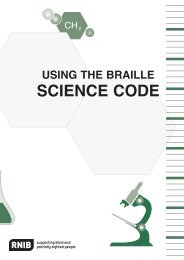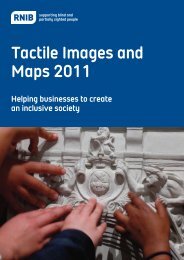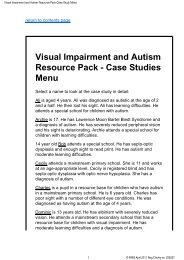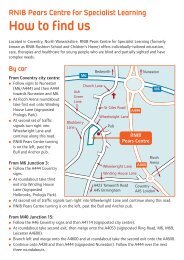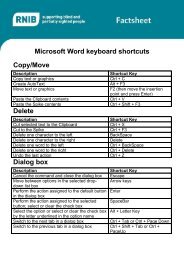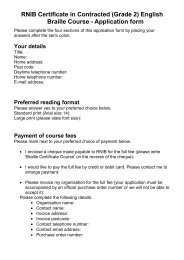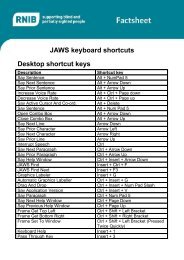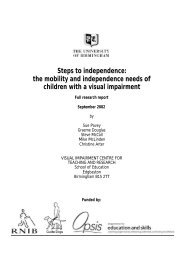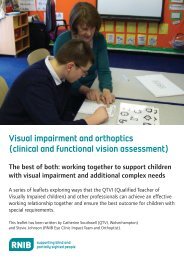RNIB Writing Wills for blind and partially sighted people guide
RNIB Writing Wills for blind and partially sighted people guide
RNIB Writing Wills for blind and partially sighted people guide
You also want an ePaper? Increase the reach of your titles
YUMPU automatically turns print PDFs into web optimized ePapers that Google loves.
<strong>Writing</strong> <strong>Wills</strong> <strong>for</strong> <strong>blind</strong> <strong>and</strong><br />
<strong>partially</strong> <strong>sighted</strong> <strong>people</strong>
This <strong>guide</strong> contains practical advice, explaining what you<br />
can do as a professional adviser to make life a little easier<br />
<strong>for</strong> clients who are <strong>blind</strong> or <strong>partially</strong> <strong>sighted</strong>. Some of the<br />
in<strong>for</strong>mation in this <strong>guide</strong> may seem obvious, but we hope<br />
you will find it useful.<br />
The majority of <strong>people</strong> with sight problems are over<br />
retirement age <strong>and</strong> making a Will can often cause them<br />
some anxiety.<br />
This <strong>guide</strong> is designed to help you to help them.
If you are meeting a <strong>blind</strong> person <strong>for</strong> the first time, you may<br />
wonder how to behave. Here are some practical suggestions,<br />
from <strong>blind</strong> <strong>people</strong> themselves, to put you at ease.<br />
At the office<br />
When a <strong>blind</strong> person visits you<br />
<strong>for</strong> the first time, ask whether<br />
they want to be <strong>guide</strong>d into<br />
the office. Don’t be offended<br />
if they tell you it’s not<br />
necessary.<br />
If your offer is accepted, walk<br />
slightly in front with the <strong>blind</strong><br />
person holding your arm.<br />
Never push them in front of<br />
you. Mention any potential<br />
hazards that lie ahead <strong>and</strong> say<br />
where they are. Always tell<br />
them if you’re approaching a<br />
flight of steps or a slope <strong>and</strong><br />
say if it goes up or down.<br />
Help your visitor to sit down by guiding them to a chair <strong>and</strong><br />
placing his or her h<strong>and</strong> on the back of it. That way the person will<br />
be able to find their way to the seat. Remember to tell them if the<br />
chair is pushed under a table.<br />
For further advice about guiding you can contact our Helpline on<br />
0303 123 9999 or email helpline@rnib.org.uk
In conversation<br />
When approaching a <strong>blind</strong> person, say who you are in case they<br />
don’t recognise your voice. During the meeting avoid addressing<br />
your remarks to a companion, as though the <strong>blind</strong> person were<br />
not there.<br />
Try to verbalise your actions <strong>and</strong> give precise instructions. If you<br />
have offered them a cup of coffee, <strong>for</strong> example, explain where<br />
you have put it down. If you need to leave the room, tell them –<br />
anyone feels foolish talking to an empty space.<br />
Don’t fuss over a <strong>guide</strong> dog without first asking the owner’s<br />
permission. A <strong>guide</strong> dog in harness is a working animal <strong>and</strong> should<br />
never be distracted.<br />
Knowing what’s in the Will<br />
If your client is unable to read a Will, one of the witnesses should<br />
read it aloud. It must be stated clearly that “I (name of witness)<br />
certify that be<strong>for</strong>e execution the Will was read over by me to<br />
(name of testator) <strong>and</strong> I further certify that I am satisfied that he/<br />
she appeared to underst<strong>and</strong> it perfectly.”<br />
Incidentally, <strong>blind</strong> <strong>people</strong> cannot witness <strong>Wills</strong> as they would be<br />
unable to see that the testator actually signed it.<br />
Signing the Will<br />
Guide your client to the place on the Will where they should sign,<br />
or someone can sign on their behalf as long as it is stated that<br />
the Will was “signed on behalf of <strong>and</strong> in the presence of (name of<br />
testator).”
The importance of print <strong>and</strong> design<br />
Print is still the usual medium <strong>for</strong> more than six in ten <strong>people</strong><br />
with sight problems. You can do a great deal to help by producing<br />
documents that are clear <strong>and</strong> easy to read, not just when it comes<br />
to preparing a Will, but in all your written correspondence.<br />
Here are a few tips:<br />
• Use a larger font size – we recommend a minimum of 12 point,<br />
but 14 or 16 point is ideal.<br />
• Use a plain typeface, such as Arial or Univers<br />
• Always ensure photocopies are crisp <strong>and</strong> clear<br />
• Don’t use glossy paper as this can create glare <strong>and</strong> is difficult<br />
to scan<br />
• Avoid italics, underlining <strong>and</strong> large blocks of capital letters as<br />
these are difficult to read<br />
• Use short paragraphs wherever possible. Solid blocks of text<br />
are particularly daunting <strong>for</strong> readers with sight problems. Put<br />
extra spacing between lines <strong>and</strong> paragraphs if you can.<br />
Making a Will in braille<br />
We do not recommend making a Will in braille as it could easily<br />
be altered (by adding or erasing dots) <strong>and</strong> the meaning changed.<br />
If, however, a client would like a braille copy or draft of their Will<br />
we can help you to arrange this. Contact <strong>RNIB</strong> Disability Access<br />
Services on 01733 37 53 70 or email businesslink@rnib.org.uk
More ways we can help<br />
<strong>RNIB</strong> is the leading UK charity <strong>for</strong> <strong>blind</strong> <strong>and</strong> <strong>partially</strong> <strong>sighted</strong><br />
<strong>people</strong>. We offer emotional <strong>and</strong> practical support to almost<br />
two million <strong>people</strong> living with sight loss in the UK today.<br />
We also campaign to get the needs of <strong>blind</strong> <strong>and</strong> <strong>partially</strong> <strong>sighted</strong><br />
<strong>people</strong> recognised. We are passionately committed to ending the<br />
isolation of sight loss <strong>and</strong> seek to change policy <strong>and</strong> provision<br />
to deliver independence, inclusion <strong>and</strong> an end to unnecessary<br />
sight loss.<br />
One third of the income we need to carry out this work comes<br />
from legacies. We are immensely grateful to everyone who<br />
chooses to support us in this way.<br />
Visit rnib.org.uk to find out more, call 0845 600 0313 or email<br />
legacyservices@rnib.org.uk<br />
© <strong>RNIB</strong> February 2012 Reg charity no. 226227




